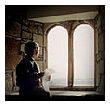Twice Hidden
Posted by Anne on Dec 8, 2015 in Naming, Writing | 7 commentsIn 1946—just on seventy years ago—three Bedouin teenagers went exploring some cliffs near the Dead Sea. There, in a cave in the wilderness, they made a discovery that would change Biblical studies forever.
Muhammed Ahmed el-Hamed, Jum’a Muhammed Khalib and Khalil Musa returned from their exploration with three scrolls covered with strange writing—the first of the literary treasures that became known as the Dead Sea Scrolls. The boys had found the long-lost library of the Essenes—a first-century treasure trove of testaments, visions, laws, rules, translations and apocalyptic works. There were books mentioned in the Bible but whose contents were previously unknown and lost texts such as the Hebrew version of Psalm 151. This short psalm by David, which rejoices in his victory over Goliath, was known from Greek translations but the Hebrew version had disappeared.
At least one fragment from every Old Testament book, except Esther, has been found. In some cases, far more than simple fragments have been recovered—the entire Book of Isaiah, for instance, has been retrieved.
Esther, of course, is the book in which the name of God is not mentioned. Perhaps that’s why the Essenes did not include it in their library.
Yet Esther is the book that is, in many ways, the one that corresponds to most people’s experience of God. His hand is hidden in daily life, just as it is hidden in the book of Esther.
Every name list I’ve ever consulted (dozens in all) has an entry explaining that ‘Esther’ means star and is Persian in origin. It allegedly derives from Ishtar, the name of the goddess who personifies the planet Venus.
Until this week, I never thought to question that theory. But on delving into some Hebrew, I discovered many rabbis consider that Esther is a Hebrew name, meaning ‘astir’, hidden. This describes so many aspects of the book of Esther: her hidden Jewish background, her hidden name (her real name is ‘Hadassah’ meaning myrtle but it’s hidden behind an allusion to Ishtar), her hidden relationship to Morcedai, her hidden agenda in inviting the king and Haman to dine with her, the hidden machinations of Haman, the hidden hand of God.
Perhaps it’s not surprising the book is missing from the library of the Essenes.
One of the most interesting comments on Esther by the rabbinic sages relates to the phrase, ‘haster astir’, from Deuteronomy 31:18 ESV, ‘And I will surely hide My face [‘haster astir panai’] in that day because of all the evil that they have done, because they have turned to other gods.’
But ‘haster astir’ is not simple concealment. It means hide the hiding. In other words, God not only hides Himself, He goes much further. He wipes out all trace of the fact He’s hidden Himself.
So often we wonder why the wonders of creation don’t point to a Creator for many people. We should not be surprised when we realise God has hidden His own hiding.
read more




